Contents
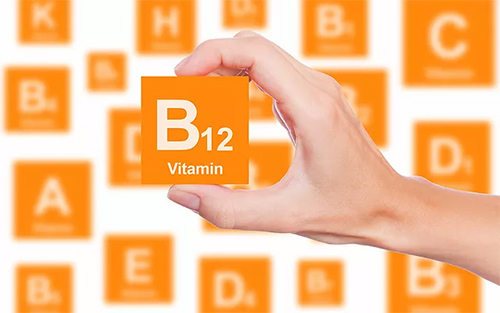
The best-known foods with vitamin B12 are liver, caviar, and oysters. However, these foods with vitamin B12 are not ideal foods for vegans and are not recommended for those with cholesterol or heart issues. Thankfully, there is no need to take B12 every day since the livers of healthy individuals contain enough reserves for at least five years.
Chemical composition: cyanocobalamin and other similar substances.
Vitamin B12 sources: The only living things capable of synthesizing this vitamin are bacteria and other microorganisms such as yeasts. The bacteria usually found in the mouth or the intestine also produce vitamin B12, although it is not assured that the body can assimilate it.
- Higher animals (fish and mammals) do not produce this vitamin, but they store it in their tissues, particularly in the liver. Milk and eggs also contain vitamin B12, as do meat and fish.
- Plants and higher algae do not produce or store vitamin B12. However, they may provide it in small amounts through contamination by certain bacteria that produce vitamin B12, as with particular seaweed, and by containing yeasts that produce B12. This is the case with certain fermented products such as beer (with or without alcohol), tempeh (fermented soybean), and even bread (in tiny amounts).
- Unicellular or blue-green algae, such as spirulina, produce significant amounts.
Vitamin B12 function: Cell division, the formation of red blood cells, and myelin (a substance that protects the nerve fibers).
Vitamin B12 Deficiency Symptoms
A lack of vitamin B12 results in anemia, in which the red blood cells are more extensive than usual. About 90 percent of macrocytic anemias in temperate climates are due to B12 or folic acid deficiencies. The production of red blood cells depends on these vitamins. Vitamin B12 is essential for maintaining the brain, especially the spinal cord.
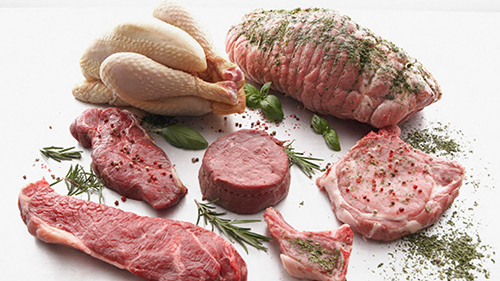
Microorganisms in the soil, gut, and mouth produce vitamin B12. The amount the body needs partially correlates with the protein intake. Thus, the higher the protein intake, the more B12 is required. Complete vegetarians and vegans face a higher risk for this deficiency, but they have the same risk for pernicious anemia.
Vitamin B12 is absorbed from foods containing it and amounts produced in the mouth and intestines. It is stored in the liver. If the stored B12 is depleted, a deficiency may occur. A protein produced in the stomach wall, called the “intrinsic factor,” greatly aids the vitamin’s absorption. This factor combines with B12 and acts as a transfer agent, guiding the vitamin across the gut lining into the blood.
Pernicious anemia results from a lack of intrinsic factors, not just from a lack of the vitamin entering the intestine. Lack of intrinsic factor may arise from atrophy of the cells producing it or from extensive surgery in which large portions of the stomach wall or intestine have been removed. In some regions of the world, a tapeworm may deprive the person of B12.
Deficiency risk: In theory, it could be said that strict vegetarians and vegans are at risk. However, in reality, there are very few cases. An ovolactovegetarian diet generally supplies sufficient vitamin B12.
The body may not assimilate the vitamin B12 in spirulina and plant-based foods such as tempeh. Due to this, it is suggested that strict vegetarians take B12 supplements.
Loss during the processing of foods: cooking destroys 30% of vitamin B12; the pasteurization of milk is about 10%.
Top Foods With Vitamin B12
Beef Liver
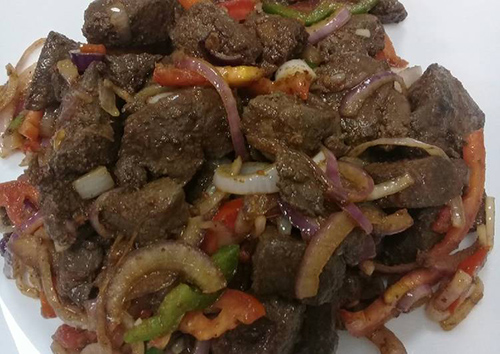
Regarding the top dietary foods with vitamin B12, beef liver is the undisputed champion. A mere 3-ounce serving boasts a staggering 70.6 micrograms, exceeding 2,941% of the daily recommended value! This makes it a nutritional powerhouse, particularly for populations at risk of deficiency, like vegans, vegetarians, and older adults.
While its unique taste might not be for everyone, incorporating small amounts of beef liver into your diet can be a surprisingly effective way to ensure optimal B12 levels and reap the benefits of this essential vitamin for energy, cognitive function, and overall well-being. Remember, moderation is vital; consulting a healthcare professional before adding liver to your diet is always recommended.
Caviar

Caviar, the luxurious indulgence, isn’t just a decadent treat; it packs a powerful punch as one of the top foods with vitamin B12. While admittedly small, a single-ounce serving delivers a whopping 236% of your daily needs. That’s right, this tiny portion provides more B12 than most fortified cereals or even a large piece of salmon! This impressive content makes caviar a valuable source for those seeking to optimize their B12 levels, especially considering its readily absorbed form.
However, the luxury comes with a price tag, literally and figuratively. Caviar’s cost-prohibitive nature makes it an impractical daily source for most. Its high sodium content also requires mindful consumption, especially for individuals with dietary restrictions. While caviar undoubtedly boasts impressive B12 content, it’s crucial to weigh its benefits against its accessibility and potential drawbacks for a well-rounded perspective.
Oysters
Dive into a world of salty delight and essential nutrients with the mighty oyster! These filter-feeding mollusks are more than just a seafood delicacy; they are on the list of the top foods with vitamin B12 for a good reason. A single serving of 3 ounces (100 grams) packs 16 micrograms of vitamin B12, exceeding 667% of your daily needs. That’s right; just six oysters grant you amazingly high levels of B12, crucial for energy production, brain health, and nervous system function.
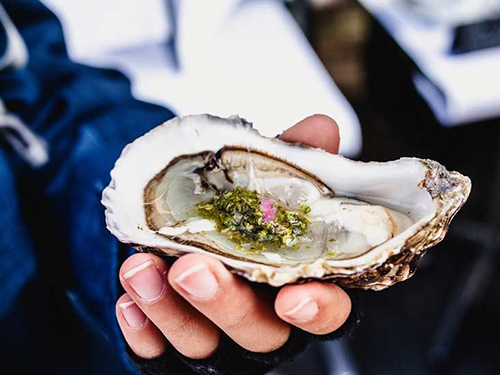
But beyond the impressive numbers, oysters offer a unique advantage: bioavailability. Unlike plant-based sources of B12, which require conversion in the body, the B12 in oysters comes readily absorbed, maximizing its benefits. This makes them a precious option for individuals with absorption issues or those following vegan or vegetarian diets.
However, remember that moderation is vital. While oysters are nutrient powerhouses, they can be high in cholesterol. They should be enjoyed as part of a balanced diet. Responsible sourcing is also crucial to ensure these precious bivalves’ sustainability. Therefore, relish the flavor and get the benefits of oysters rich in B12, but do so with a conscious approach to ensure the best possible health and environmental responsibility.
Herring
Herring, often overshadowed by flashier seafood options, might be your secret weapon regarding foods with vitamin B12. Don’t underestimate this humble fish! A 3-ounce serving packs a punch with around 5-8 micrograms of B12, covering 208-333% of your daily needs. That’s more B12 than a typical serving of salmon or tuna!
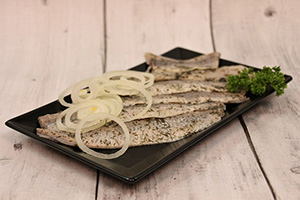
But the benefits don’t stop there. Herring comes in various forms, each offering its own B12 bounty. Fresh or pickled herring delivers a straightforward hit. At the same time, smoked varieties like kippers boast even higher concentrations, reaching up to 18.7 micrograms per serving.
Herring should be considered a true nutritional powerhouse because it is an abundant source of omega-3 fatty acids and essential minerals. Furthermore, herring is of a very high nutritional value. However, it’s essential to consider potential drawbacks. Some preparation methods, like grilling or frying, can significantly reduce B12 content. Opting for gentler cooking techniques like steaming or poaching helps preserve this valuable nutrient. Additionally, specific herring varieties might contain higher mercury levels, so be mindful of consumption frequency and choose low-mercury options whenever possible.
Sardine
Sardines, the tiny titans of the sea, are more than just budget-friendly bites; they’re also on the list of foods with vitamin B12 for a reason! A 3.5-ounce serving, about the size of a standard can, explodes with a staggering 5.2 micrograms of B12, exceeding 217% of your daily needs. That’s right; these little fish pack a bigger B12 punch than their flashier cousins, like salmon or tuna!
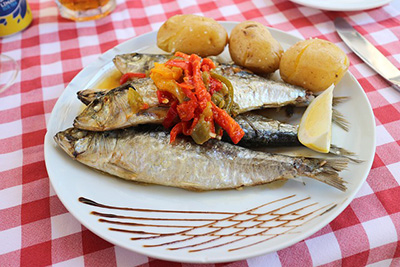
Sardines are brimming with omega-3 fatty acids, essential for heart health and brain function. They also have calcium, vitamin D, and selenium, supporting strong bones, immunity, and thyroid function. Talk about a multivitamin in a can!
Plus, their affordability and versatility make them a winner. Enjoy them straight from the can, toss them on salads, or incorporate them into pasta dishes and spreads. Whether fresh, canned, or smoked, sardines offer a delicious and convenient way to boost your B12 intake.
However, mindful consumption is vital. Sardines can be high in sodium, so opt for water-packed varieties or rinse canned sardines to reduce sodium content. Additionally, while generally low in mercury, larger varieties like Pacific sardines might have slightly higher levels, so prioritize smaller varieties or limit consumption of larger ones.
Sardines are a nutritional powerhouse, offering a delicious and affordable way to skyrocket your B12 intake and reap many other health benefits. Just remember to choose sodium-conscious options and be mindful of mercury levels in larger varieties for optimal enjoyment and well-being.
A:
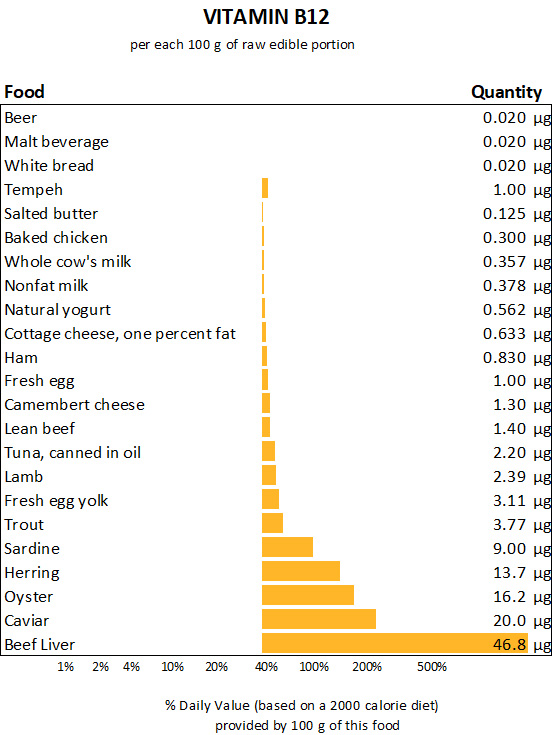
DISCLAIMER: All content on this website is presented solely for educational and informational objectives. You should not rely on the information provided as a replacement for advice, diagnosis, or treatment from a qualified medical expert. If you are pregnant, nursing, or have any preexisting medical concerns, you should talk to your doctor before using any herbal or natural medicines.
REFERENCES
- George D. Pamplona-Roger, M.D. “Encyclopedia of Foods and Their Healing Power.” George D. Pamplona-Roger, M.D. Encyclopedia of Foods and Their Healing Power. Trans. Annette Melgosa. Vol. 1. Chai Wan: Editorial Safeliz, 2005. 395. Print.
- Hardinge, Mervyn G and Harold Shryock. “Family Medical Guide.” Hardinge, Mervyn G and Harold Shryock. Family Medical Guide. Ed. Marvin Moore and Bonnie Tyson-Flynn. Vol. three. Oshawa; Washington, D.C.; Hagerstown: Pacific Press Publishing Association; Review and Herald Publishing Association, 1999. Three vols. 61. Print. [foods with vitamin B12]
- National Institutes of Health Office of Dietary Supplements: https://ods.od.nih.gov/factsheets/VitaminB12-HealthProfessional/
